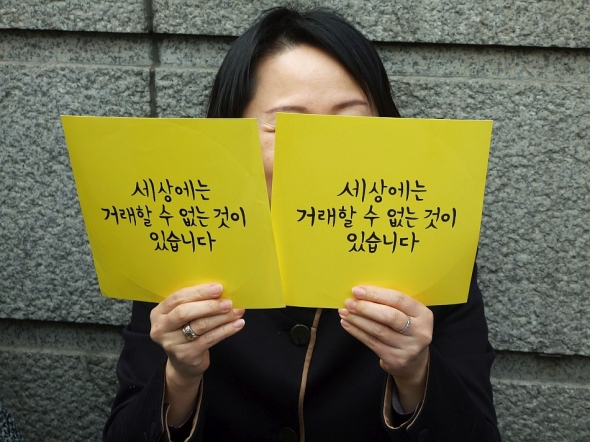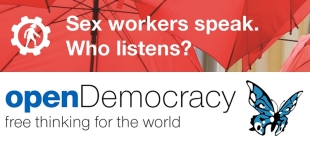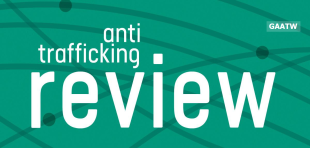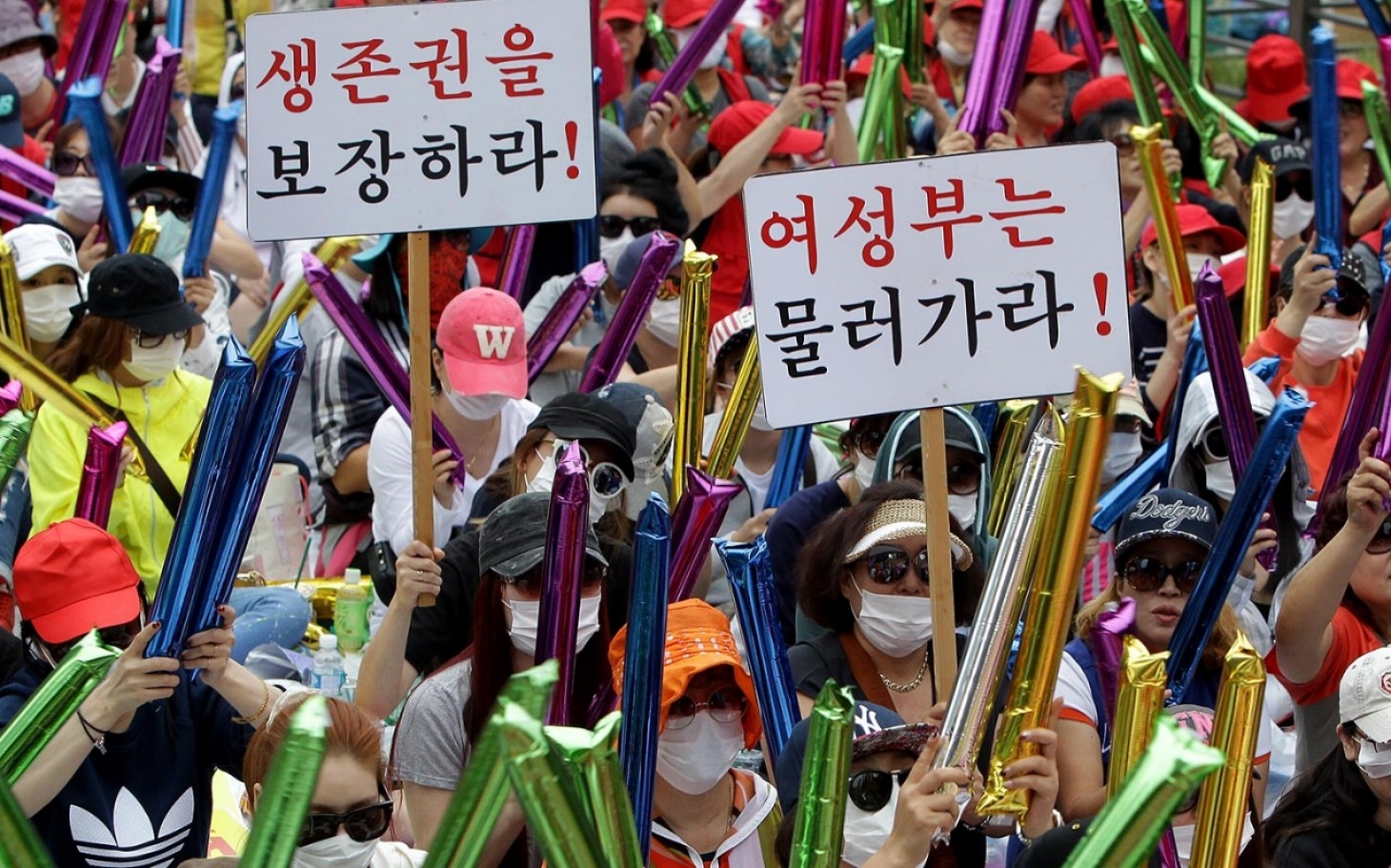[Photo] Queer Sex Workers’ Lives Matter
![[97b] Queen Sex Workers' Lives Matter © Matt Lemon Photography. All Rights Reserved.](https://researchprojectkorea.files.wordpress.com/2017/07/97b-queen-sex-workers-lives-matter-c2a9-matt-lemon-photography-all-rights-reserved.jpg?w=590)
Torsos only for privacy reasons. © Matt Lemon Photography. All Rights Reserved.
Despite a military crackdown on gay servicemen, politicians refusing to enact anti-discrimination legislation, and fundamentalist faith groups engaging in “Homosexuality Countermeasures”, South Korea has just witnessed its biggest-ever queer parade. Korean sex workers’ rights activist Yeoni Kim and others carried a message on their T-shirts that still needs plenty of amplifying, not only but especially in Korea: Queer Sex Workers’ Lives Matter! LGBT 성노동자도 함께 합니다!
Please click here to continue reading.
Re-blogged: Will South Korea’s queer movement embrace or abandon MTF transgender sex workers?
Lucien Lee at the 2014 Korea Queer Festival in Seoul.
Photo © KQCF (left) and © Lucian Lee (right). All Rights Reserved.
By transgender sex worker Lucien Lee in Seoul
한국어 원본을 보시려면 여기를 누르세요.
Please note that the different copyrights for the respective photos.
Homosexuals once used to be outlaws, persecuted by the police and at the mercy of powerful justice systems in countries we now refer to as advanced. However, many places remain where homosexuals continue to be persecuted and even killed. In South Korea, however, homosexuals have never been outlaws. Unless a homosexual male engages in sexual activities with another person of the same gender while on leave from his mandatory military service, in which case the infamous Article 92 (6) of the Military Criminal Code, also known as “Sodomy Law”, applies, South Korea does not outlaw homosexuality. [1]
That may have been the reason why South Korea’s queer community had great difficulties to accept it when sex workers, who are criminals according to the 2004 Anti-Sex Trade Laws, joined the 2013 Korean Queer Festival and identified themselves as sexual minorities oppressed by sexual morality. Comments like “What are you whores doing here?” came as no surprise because nobody would want to mingle with outlaws.
When I joined the Korea Queer Festival a year later as a transgender sex worker together with other sex workers, the reactions from people were quite different. Maybe that was because they couldn’t easily other me as a non-queer “whore” because I am a male to female transgender person. That day, we handed out a thousand copies of “A letter from independent sex worker ‘T’ to the LGBAIQ community”. [2] But other than that, sex workers’ rights are still not considered a part of queer issues.
Various research reports provide data about the ratio of sex workers among transgender people but those figures vary widely due to their limited sample sizes. It is undeniable, however, that those working at Itaewon’s transgender bars are the most visible group of South Korea’s transgender community.
On May 23rd, 2015, South Korean daily Dong-a Ilbo featured an article about transgender sex workers, which revealed the particular locations, times, and how much money is required to buy sexual services. But even before that article, it was impossible to hide transgender sex workers from the public view, and this visibility, together with a greater awareness among the cis-straight society in general, will likely result in police raids specifically targeting transgender sex workers, just as they targeted and demolished red light districts before.
A taxi driver interviewed for the abovementioned article said, “I’ve been a taxi driver for almost twenty years, and they [transgender sex workers] were already here when I started.” Traditionally, sex work is often the only viable source of income for male-to-female transgender people. We cannot survive economically if such a transgender-specific persecution occurs. We cannot easily change our jobs.
Sex workers and activists protest in front of South Korea’s Constitutional Court.
© 2015 Matt Lemon Photography. All Rights Reserved.
On April 9th, 2015, a first public hearing was held at South Korea’s constitutional court in the ongoing review to determine whether the 2004 Anti-Sex Trade Laws are unconstitutional. Article 21 (1) of the Anti-Sex Trade Laws Punishment Act penalises sellers of sexual acts with up to one year in prison or fines of up to 3 million won (approx. £1,765/€2,485/$2,735), except for those who were coerced. The article is not gender-specific and therefore applies to male and transgender sex workers, too.
The female sex worker, whose arrest and subsequent trial led to the constitutional review, standing in the middle of the above photo, argues in favour of the decriminalisation of sex work limited to female sex workers only. However, members of South Korean feminist organisations, who used to advocate for what they referred to as “decriminalising female prostitutes”, have spoken out against this woman as they fear that if the article were to be ruled unconstitutional, buying sexual acts would also no longer be criminalised. Even if one were to accept their opinion that female sex workers are victims of a capitalist system, and hence innocent, whereas male buyers are guilty, their insistence on keeping the 2004 Anti-Sex Trade Laws makes no sense, as it punishes innocent people.
Anti-prostitution activist holding up signs saying
“There are things in the world that cannot be traded.”
© 2015 Matt Lemon Photography. All Rights Reserved.
Despite the importance of this review, none of the LGBT organisations has so far made their stance on this issue publicly known. That is one of the reasons why, although the sexual minority movement is often referred to as “LGBT” or “queer” movement, in reality, it is more considered as a “homosexual” movement by the public.
Police raids targeting transgender sex workers would force transgender people to organise demonstrations in the same way as sex workers working at the Yeongdeungpo red light district did to protect their right to survive. If such protests were to happen, I wonder what stance LGBT organisations would take. Would they abandon transgender sex workers or stand together with them? Let us all take this very seriously and think about it together. See you all at the 2015 Korea Queer Festival.
Footnotes
[1] While engaging in sexual activities on military premises is generally forbidden, Article 92 (6) of the Military Penal Code states that “anal intercourse or other harassment against any person … shall be punished by imprisonment of up to two years” even if it occurs while on leave. LGBT rights’ activists argue that this paragraph is used to single out sexual relations between members of the same sex.
[2] A small clarification for readers less familiar with the acronyms: LGBTAIQ stands for lesbian, gay, bisexual, transgender, asexual, intersex, and queer, and the T was here purposefully left out as ‘T’ addressed the LGBAIQ community.
Translation by Lucien Lee. Edited by Matthias Lehmann. I would like to thank Lucien Lee for her permission to reblog this article. The English version differs slightly from the Korean original and features two different photos. Footnotes were added for further clarification.










